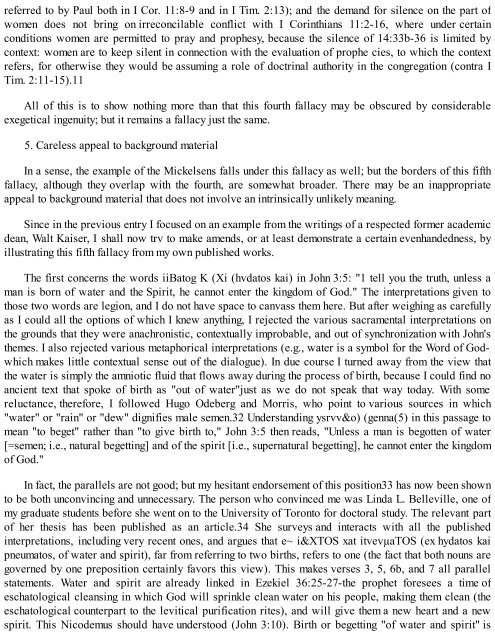Exegetical Fallacies - D. A. Carson
Exegetical Fallacies - D. A. Carson
Exegetical Fallacies - D. A. Carson
Create successful ePaper yourself
Turn your PDF publications into a flip-book with our unique Google optimized e-Paper software.
eferred to by Paul both in I Cor. 11:8-9 and in I Tim. 2:13); and the demand for silence on the part of<br />
women does not bring on irreconcilable conflict with I Corinthians 11:2-16, where under certain<br />
conditions women are permitted to pray and prophesy, because the silence of 14:33b-36 is limited by<br />
context: women are to keep silent in connection with the evaluation of prophe cies, to which the context<br />
refers, for otherwise they would be assuming a role of doctrinal authority in the congregation (contra I<br />
Tim. 2:11-15).11<br />
All of this is to show nothing more than that this fourth fallacy may be obscured by considerable<br />
exegetical ingenuity; but it remains a fallacy just the same.<br />
5. Careless appeal to background material<br />
In a sense, the example of the Mickelsens falls under this fallacy as well; but the borders of this fifth<br />
fallacy, although they overlap with the fourth, are somewhat broader. There may be an inappropriate<br />
appeal to background material that does not involve an intrinsically unlikely meaning.<br />
Since in the previous entry I focused on an example from the writings of a respected former academic<br />
dean, Walt Kaiser, I shall now trv to make amends, or at least demonstrate a certain evenhandedness, by<br />
illustrating this fifth fallacy from my own published works.<br />
The first concerns the words iiBatog K (Xi (hvdatos kai) in John 3:5: "1 tell you the truth, unless a<br />
man is born of water and the Spirit, he cannot enter the kingdom of God." The interpretations given to<br />
those two words are legion, and I do not have space to canvass them here. But after weighing as carefully<br />
as I could all the options of which I knew anything, I rejected the various sacramental interpretations on<br />
the grounds that they were anachronistic, contextually improbable, and out of synchronization with John's<br />
themes. I also rejected various metaphorical interpretations (e.g., water is a symbol for the Word of Godwhich<br />
makes little contextual sense out of the dialogue). In due course I turned away from the view that<br />
the water is simply the amniotic fluid that flows away during the process of birth, because I could find no<br />
ancient text that spoke of birth as "out of water"just as we do not speak that way today. With some<br />
reluctance, therefore, I followed Hugo Odeberg and Morris, who point to various sources in which<br />
"water" or "rain" or "dew" dignifies male semen.32 Understanding ysrvv&o) (genna(5) in this passage to<br />
mean "to beget" rather than "to give birth to," John 3:5 then reads, "Unless a man is begotten of water<br />
[=semen; i.e., natural begetting] and of the spirit [i.e., supernatural begetting], he cannot enter the kingdom<br />
of God."<br />
In fact, the parallels are not good; but my hesitant endorsement of this position33 has now been shown<br />
to be both unconvincing and unnecessary. The person who convinced me was Linda L. Belleville, one of<br />
my graduate students before she went on to the University of Toronto for doctoral study. The relevant part<br />
of her thesis has been published as an article.34 She surveys and interacts with all the published<br />
interpretations, including very recent ones, and argues that e~ i&XTOS xat itvevµaTOS (ex hydatos kai<br />
pneumatos, of water and spirit), far from referring to two births, refers to one (the fact that both nouns are<br />
governed by one preposition certainly favors this view). This makes verses 3, 5, 6b, and 7 all parallel<br />
statements. Water and spirit are already linked in Ezekiel 36:25-27-the prophet foresees a time of<br />
eschatological cleansing in which God will sprinkle clean water on his people, making them clean (the<br />
eschatological counterpart to the levitical purification rites), and will give them a new heart and a new<br />
spirit. This Nicodemus should have understood (John 3:10). Birth or begetting "of water and spirit" is



